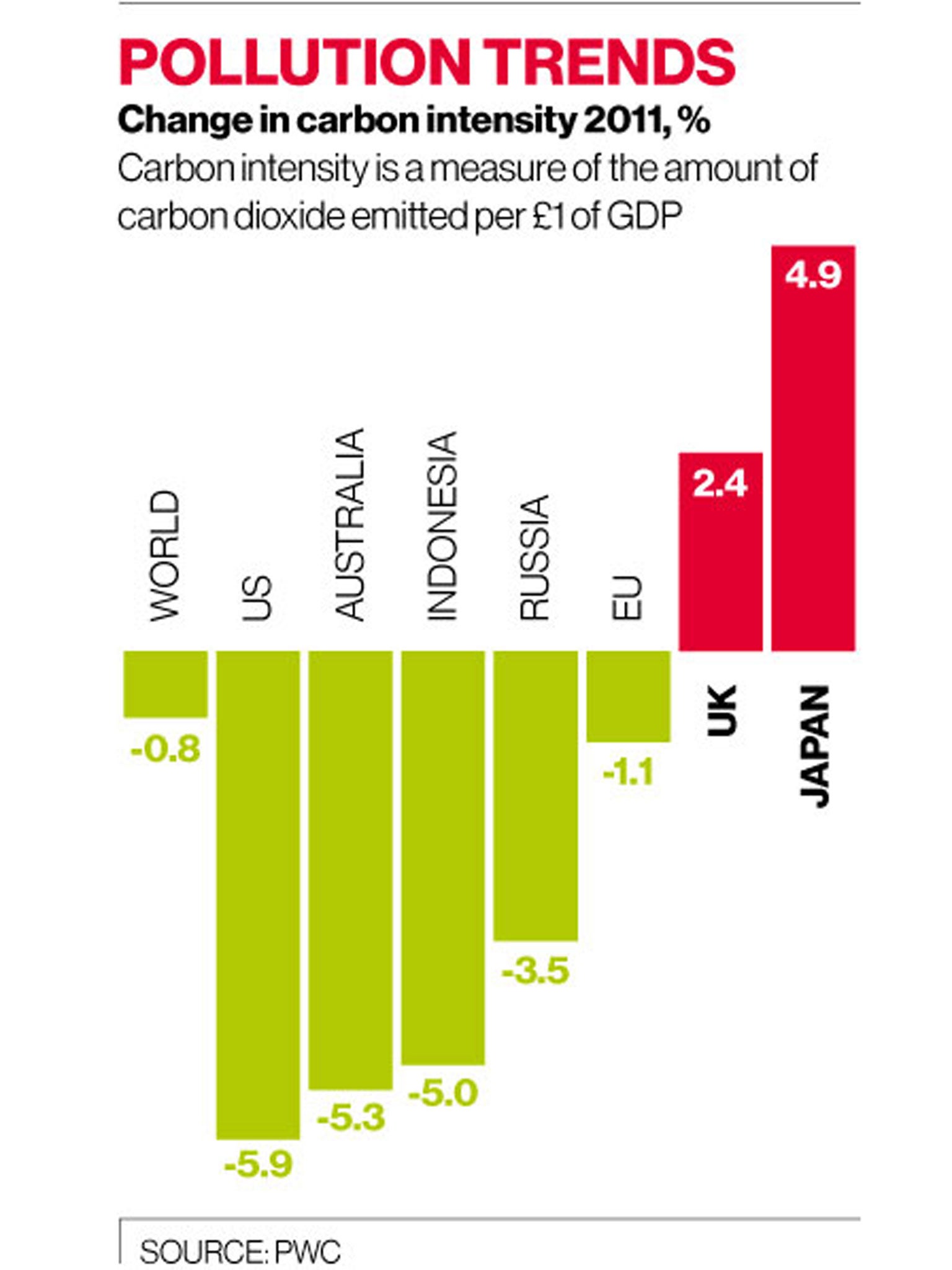Black mark: Britain's shame as carbon emissions climb
Power generators' switch from gas to coal sees 2.4-per-cent jump in 'carbon intensity'

Britain's carbon emissions climbed by more than almost any other major economy last year, relative to its economic output, as power generators switched from gas to coal to take advantage of falling prices.
The amount of CO2 emitted per £1 of economic output - known as its carbon intensity - jumped by 2.4 per cent in 2012. This compared to a 2.7 per cent average decrease among the G7 leading economies and a 0.8 per cent drop worldwide.
Among the 20 biggest economies, only India and Japan saw a larger rise in carbon intensity - of 3.9 per cent and 4.9 per cent, respectively - while the US dropped by 5.9 per cent and Australia by 5.3 per cent, according to a new report from PwC, the consultancy.
Britain's rising emissions were largely down increasing coal use, as the US shale gas boom forced American mining companies to flood the European market with coal they can no longer sell at home.
However, despite the increase, the UK is still the second most energy efficient economy in the so-called G20 last year, behind Italy - reflecting, in part, its lack of heavy industry.
Britain's rising carbon intensity last year prompted a 2.6 per cent rise total carbon emissions as the economy grew by 0.3 per cent.
Elsewhere, the report warned that the world is hurtling towards the point at which a 2C increase in the temperature becomes all but impossible to avoid. This is the level at which the consequences of climate change become increasingly catastrophic.
"G20 countries are still consuming fossil fuels like there's no tomorrow. Despite rapid growth in renewables, they still remain a small part of the energy mix and are overwhelmed by the increase in the use of coal," said Jonathan Grant, PwC's director of sustainability and change.
"Something's got to give, and potentially soon. This has implications for a raft of investments in carbon intensive technologies that are currently being planned and executed today," he added.
The world is on track to burn within 21 years the maximum amount of fossil fuels that can be consumed if the world is to have a reasonable chance of staying within 2C global warming, according to PwC.
Based on the current rate of emissions reductions and economic growth predictions, the so-called carbon budget will have been used up by 2034.
The report finds that global carbon intensity needs to reduce by 6 per cent every year to the end of the century - a level that has never been achieved in a single year before and which compares to the recent level of 0.7 per cent.
"The results raise real questions about the viability of our vast fossil fuel reserves, and the way we power our economy. The 2 degrees carbon budget is simply not big enough to cope with the unmitigated exploitation of these reserves," Mr Grant said.
The report identified progress in becoming more energy efficient as "one bright spot" in its analysis.
Some 92 per cent of the small reduction in carbon intensity achieved last year is down to improvements in energy efficiency, with the remaining 8 per cent due to a shift towards cleaner energy. But the report warns there is a limit to which we can cut energy use per unit of GDP.
The report points out that the shale gas, or fracking, revolution in the US has helped lower emissions in the country as power producers switch from coal to cheaper gas. However, it says that this has merely increased coal usage elsewhere - for example in the EU and UK - "raising concerns that decarbonisation in one country can just shift emissions elsewhere".
Join our commenting forum
Join thought-provoking conversations, follow other Independent readers and see their replies
Comments
Bookmark popover
Removed from bookmarks